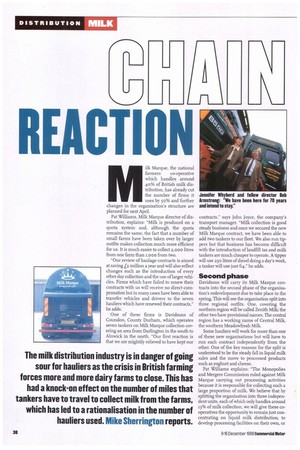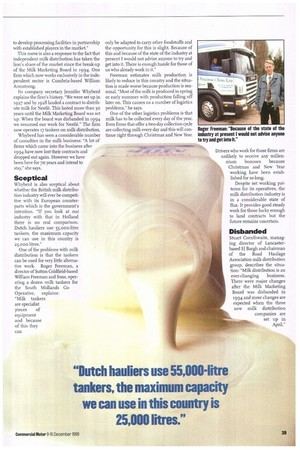REACTION
Page 40

Page 41

If you've noticed an error in this article please click here to report it so we can fix it.
IIIilk Marque, the national
farmers co-operative which handles around 40% of British milk distribution, has already cut the number of firms it uses by 50% and further changes in the organisation's structure are planned for next April.
Pat Williams, Milk Marque director of distribution, explains: "Milk is produced on a quota system and, although the quota remains the same, the fact that a number of small farms have been taken over by larger outfits makes collection much more efficient for us. It is much easier to collect 2,000 litres from one farm than L000 from two.
"Our review of haulage contracts is aimed at saving La million a year and will also reflect changes such as the introduction of every other day collection and the use of larger vehicles. Firms which have failed to renew their contracts with us will receive no direct compensation but in many cases have been able to transfer vehicles and drivers to the seven hauliers which have renewed their contracts," he adds.
One of these firms is Davidsons of Coundon, County Durham, which operates seven tankers on Milk Marque collection covering an area from Darlington in the south to Alnwick in the north. "Our first reaction is that we are mightily relieved to have kept our contracts," says John Joyce, the company's transport manager. "Milk collection is good steady business and once we secured the new Milk Marque contract, we have been able to add two tankers to our fleet. We also run tippers but that business has become difficult with the introduction of landfill tax and milk tankers are much cheaper to operate. A tipper will use 250 litres of diesel doing a day's work, a tanker will use just 64," he adds.
Second phase
Davidsons will carry its Milk Marque contracts into the second phase of the organisation's redevelopment due to take place in the spring. This will see the organisation split into three regional outfits. One, covering the northern region will be called Zenith Milk; the other two have provisional names. The central region has a working name of Central Milk, the southern Meadowfresh Milk.
Some hauliers will work for more than one of these new organisations but will have to run each contract independently from the other. One of the key reasons for the split is understood to be the steady fall in liquid milk sales and the move to processed products such as yoghurt and cheese.
Pat Williams explains: "The Monopolies and Mergers Commission ruled against Milk Marque carrying out processing activities because it is responsible for collecting such a large proportion of milk. We believe that by splitting the organisation into three independent units, each of which only handles around 13% of milk collection, we will give these cooperatives the opportunity to remain just concentrating on liquid milk distribution, to develop processing facilities on their own, or to develop processing facilities in partnership with established players in the market."
This move is also a response to the fact that independent milk distribution has taken the lion's share of the market since the break-up of the Milk Marketing Board in r994. One firm which now works exclusively in the independent sector is Cumbria-based William Armstrong.
Its company secretary Jennifer Whyberd explains the firm's history. We were set up in 1927 and by 1928 landed a contract to distribute milk for Nestle. This lasted more than 30 years until the Milk Marketing Board was set up. When the board was disbanded in 1994 we resumed our work for Nestk." The firm now operates 17 tankers on milk distribution.
Whyberd has seen a considerable number of casualties in the milk business: "A lot of firms which came into the business after 1994 have now lost their contracts and dropped out again. However we have
been here for 70 years and intend to
stay," she says.
Sceptical
Whyberd is also sceptical about whether the British milk distribution industry will ever be competitive with its European counterparts which is the government's intention. If you look at our industry with that in Holland there is no real comparison. Dutch hauliers use 55,000-litre tankers, the maximum capacity we can use in this country is 25,000 litres."
One of the problems with milk distribution is that the tankers can be used for very little alternative work. Roger Freeman, a director of Sutton Coldfield-based William Freeman and Sons, operating a dozen milk tankers for the South Midlands Co Operative, explains: "Milk tankers are specialist pieces of equipment and because of this they can only be adapted to carry other foodstuffs and the opportunity for this is slight. Because of this and because of the state of the industry at present I would not advise anyone to try and get into it. There is enough hassle for those of us who already work in it."
Freeman estimates milk production is likely to reduce in this country and the situation is made worse because production is seasonal. "Most of the milk is produced in spring or early summer with production falling off later on. This causes us a number of logistics problems," he says.
One of the other logistics problems is that milk has to be collected every day of the year. Even firms that offer a two-day collection cycle are collecting milk every day and this will continue right through Christmas and New Year. Drivers who work for those firms are unlikely to receive any millennium bonuses because Christmas and New Year working have been established for so long.
Despite set working patterns for its operatives, the milk distribution industry is in a considerable state of flux. It provides good steady work for those lucky enough to land contracts but the future remains uncertain.
Disbanded
Stuart Corn thwaite, managing director of Lancasterbased SJ Bargh and chairman of the Road Haulage Association milk distribution group, describes the situation: "Milk distribution is an ever-changing business. There were major changes after the Milk Marketing Board was disbanded in 1994 and more changes are expected when the three new milk distribution companies are set up in April."




































































































